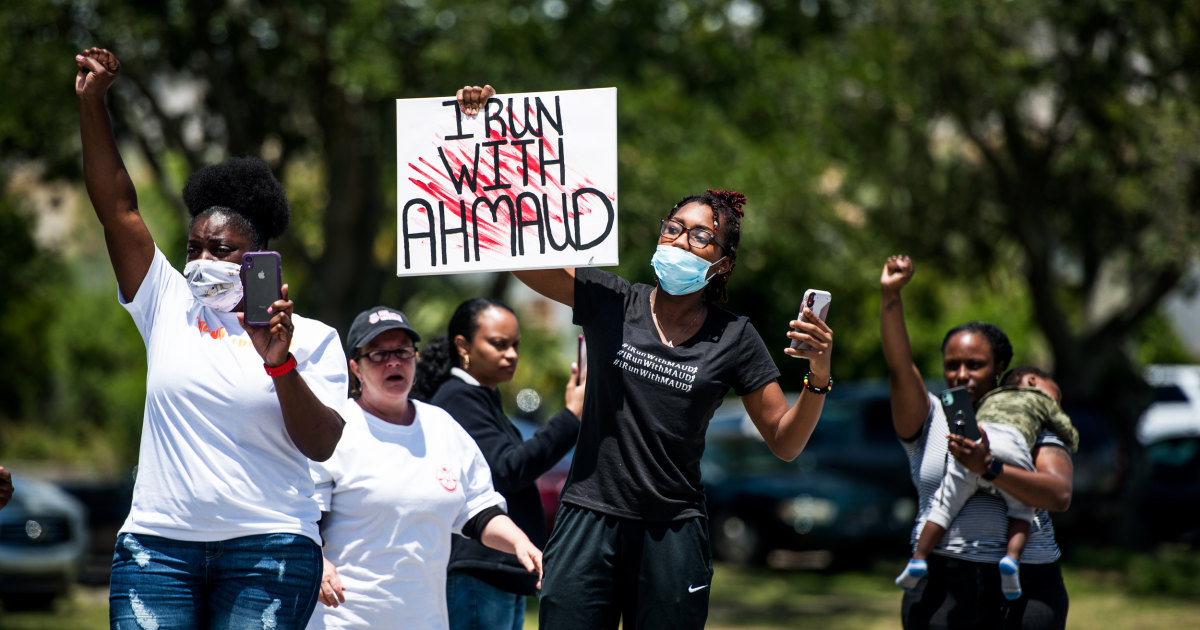
Jury selection began Monday in Georgia in the trial of three white men charged in the death of Ahmaud Arbery, who was fatally shot as he was running in their neighborhood in February 2020.
The three men, father and son Gregory and Travis McMichael and their neighbor William “Roddie” Bryan, are charged with murder and aggravated assault.
Jury selection could take more than two weeks as attorneys work to seat a panel of 12 jurors and four alternates.
The 600 prospective jurors who were ordered to report Monday were held at a nearby gymnasium to allow for social distancing as attorneys argued motions before Chatham County Superior Court Judge Timothy Walmsley. During jury selection, the potential jurors will be taken to the courthouse in groups of 20, a Glynn County Superior Court clerk said.
The first panel of 20 jurors was sworn in and questioned Monday afternoon as a group.
At least 12 people raised their hands when Jason Sheffield, one of Travis McMichael’s attorneys, asked them whether they had any negative feelings about the defendants, The Associated Press reported.
When a prosecutor asked the first panel whether they would like to serve on the jury, only one person, a white man in his mid-20s, raised his hand.
The death of Arbery, 25, sparked nationwide protests after a graphic cellphone video of the encounter near Brunswick in Glynn County was leaked online more than two months after he was killed on the afternoon of Feb. 23, 2020.
The video, which was shot by Bryan, showed a brief fight between Arbery, who was Black, and Travis McMichael, who fired his shotgun at Arbery at close range.
All three men were denied bond and have been held in a Glynn County jail. They also have been indicted under federal hate crime and kidnapping laws.
In September, Jacquelyn Johnson, the former chief prosecutor for the Brunswick area who briefly handled the case, was indicted on charges of violating her oath of public officer and obstructing a police officer. The indictment accused her of showing “favor and affection” to Gregory McMichael, who had worked previously in her office.
Arbery’s death prompted the Georgia Legislature to pass the state’s first hate crimes statute.
Arbery’s parents, Wanda Cooper Jones and Marcus Arbery Sr., and their attorneys were in court for the proceedings.
Attorneys asked individual questions of three prospective jurors.
The first, a white man in his 60s originally from Ohio, said that he had seen the video fewer than five times and that he believed Gregory McMichael had stalked Arbery. He said he was open to being a juror.
The second prospective juror, a white man in his late 30s, said that he has anxiety and depression and that he had shared the video with others. He also said his brother, whom he lives near, had also received a jury summons and is scheduled to report for jury duty next week. He said he didn’t want “to be here” or to have other people’s lives in his hands. He also said he knew an officer who is listed as a potential witness.
A third prospective juror, a white woman in her mid-60s, said she has lived in St. Simons, an island off Georgia, for about a year. She said she had negative feeling about Travis McMichael.
“A man died, so yeah, I have a pretty negative feeling about that,” she said, according to a court pool report. “I don’t feel very good about him.”
The woman, who attended a segregated school from first grade until high school or so, said she does not understand why Bryan recorded the fatal encounter.
Outside the courthouse Monday, Marcus Arbery Sr. told reporters that he believed his son was pursued and killed because of his race, and his attorney, civil rights lawyer Benjamin Crump, said the case was “eerily similar to that of Trayvon Martin, another young African American who was shot and killed by a citizen.” (Crump represented Martin’s family.)
The difference, Crump said, is that there is video of Arbery’s killing. Crump, who described the defendants as a “lynch mob,” said he expected full justice for Arbery.
Martin, 17, was fatally shot by George Zimmerman, a neighborhood watch volunteer, in Sanford, Florida, in February 2012. Martin’s death ignited a national debate about racial profiling. Zimmerman was found not guilty of second-degree murder and manslaughter.
Source: | This article originally belongs to Nbcnews.com









